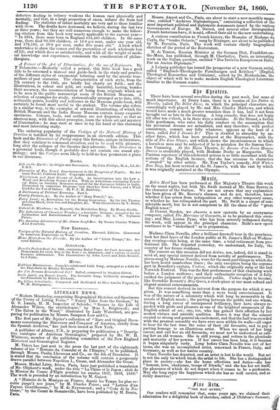Madame Clara Novello, after a brilliant farewell tour in the
provinces, took her final leave of the London public at St. James's Hall on Wednes- day evening—this being, at the same time, a total retirement from pro- fessional life. She departed yesterday, we understand, for Italy, the country of her future residence.
The concert on this occasion did not derive, nor, indeed, did it stand in need of, any special interest derived from novelty of performances. The pieces sung by Madame Novello, were for the most part things in which she has been heard numberless times ; the only exception being the soprano part in Benedict's cantata, Undine, which she originally sung at the last Norwich Festival. This was the first performance of that charming work before a London audience ; and their enthusiastic reception of it fully ratified the judgment of the provincial public. Undine ought to become, like Sterndale Bennett's May Queen, a stock-piece at our most refined and elegant musical entertainments.
But this concert derived its interest from the purpose for which it was given. It was something more than a mere vocal entertainment. It was of the nature of a solemnity which will long be memorable in the annals of English music ; the parting between the public and one whom, during a long career of unsurpassed brilliancy, they have always re- garded with pride and pleasure as one of the brightest ornaments of the English school of art; one, too, who has gained their affection by her modest virtues and amiable qualities. Hence it was that the concert created so strong and general an excitement, and that the hall was crowded with the greatest assembly we have ever seen within its walls—all eager to hear for the last time the voice of their old favourite, and to pay a parting homage to an illustrious artist. When we speak of her Imig career, and call her an old favourite, we must not be understood as call- ing her an old woman. She is still young, and retires in the plenitude and maturity of her powers. If her career has been long, it is because it began singularly early. Long before Clara Novello was out of her teens, she was an accomplished artist, renowned in France, Italy, and Germany{ as well as her native country.
Clara Novello has departed, and an artist is lost to the world. But art is not the only tie which binds the artist to life. She has a distinguished place in society—she has the home affections and duties—she has "honour, love, obedience, troops of friends," and she has her art itself, the pleasures Of which do not depart when it ceases to be a profession. May she long enjoy the happiness which she has so well earned, and so richly deserves !


























 Previous page
Previous page